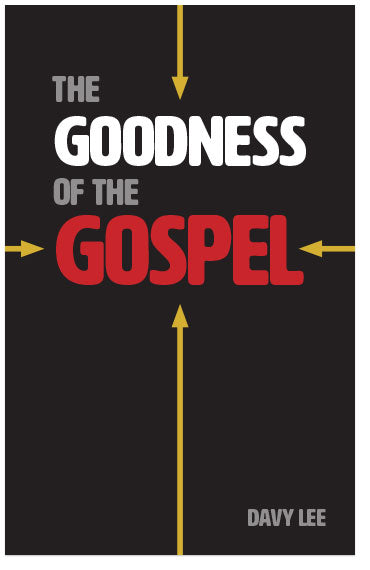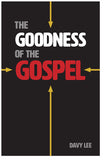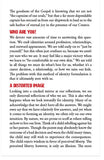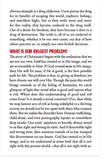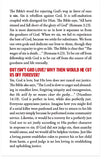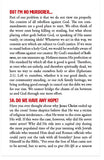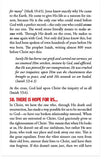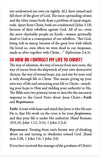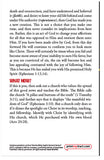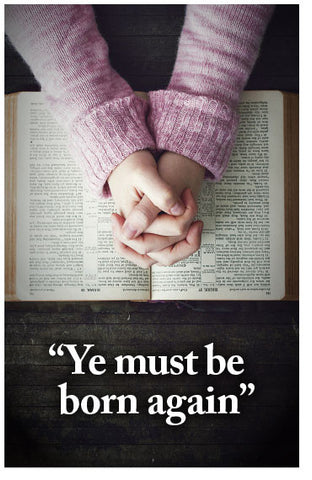The Goodness of the Gospel
Special-Order Folded Tract
 NOTE: This item is custom-printed to order (click for more details).
NOTE: This item is custom-printed to order (click for more details).
This tract is from our print-on-demand library, and is not kept in stock. Select the options below, and we will custom-print a batch just for you. Because this item is custom-printed, you can add your custom imprint to the back page at no extra cost.
- Estimated shipping date: Monday, January 12 (Click for more details)
- SKU:
- Discounts: Discount coupons do not apply to this item
- Format: Folded Tract
- Size: 3.5 inches x 5.5 inches
- Pages: 8
- Imprinting: Available with 5 lines of custom text
- Version: ESV
- Returns: Because this item is custom-printed to order, it cannot be returned.
Show all item details
The full text of this tract is shown below in the ESV version. (Do you want to print this tract in a different version than the one listed? Contact us and let us know what you're looking for—we may be able to create the alternate version for you at no charge.)
The goodness of the Gospel is knowing that we are not “the captains of our souls,” but that a far more dependable captain has rescued us from our shipwreck to lead us to the safe harbor of eternal joy in the presence of our Creator.
Who are you?
We devote vast amounts of time to answering this question. We craft identities around profession, relationships, and outward appearances. We are told early on to “just be yourself,” but this often just confuses us, because we aren’t yet sure who we are. It may feel like a major victory when we learn to “be comfortable in our own skin.” We are told in all things we must do what’s best for us, whether it’s a career decision, a relationship, or how we raise our kids. The problem with this method of identity formulation is that it ultimately rests with us.
A Distorted Image
Looking into a cracked mirror at our reflections, we see only distorted reflections of who we are. This is also what happens when we look inwardly for identity. Many of us acknowledge that we don’t have all the answers. We might even say that we have relatively few answers, and yet when it comes to forming an identity, we often rely on our own intuition. By nature, we are prone to scoff at others telling us how to live our lives. Think of a child rebelling against his or her parents. Though the parent may absolutely know the outcome of a bad decision and warn the child many times, the child may still wish to experience the consequences. The child rejects wisdom in favor of perceived liberty. The perceived liberty, however, is only an illusion. The most obvious example is a drug addiction. Users pursue the drug for its benefits of escaping this world, euphoric feelings, and matchless highs, but as they settle more and more for this reality, they become enslaved to the drug itself. Out of a desire for freedom, they have become a slave to a drug of destruction. The truth is, all of us are enslaved to something, whether it be our own career, our fear of how others perceive us, or simply our own foolish decisions.
What is our biggest problem?
The story of Christianity begins with the realization that we are not our own. God has created us in His image, and we are accountable to Him. If God created man in His image, then His will for man, if He is good, is the best possible path for life. The problem is that, in giving us freedom, we have chosen our will over His. Though the pain this world brings reminds us of the failing of humanity, we catch glimpses of light that reveal what is good and expose what is evil. Where does this understanding of good and evil come from? Is it merely a social construct? If so, then while we may lament acts of evil as being unhelpful to a thriving society, we should not be too upset with those who commit them. But we realize the absurdity here. Human-trafficking, child abuse, and even pornography repulse us somewhere deep inside. Our souls’ repulsion to horrific abuses reveal to us that right and wrong do exist. And if discernible right and wrong exist, then someone outside of us has stamped this discernment on our hearts. God has created us in His image, and so we understand at some level that all is not right with this present world—that all is not right with us.
The Bible’s word for rejecting God’s way in favor of ours is sin. Sin is rebellion against God. It is self-exaltation coupled with disregard for Him. The Bible says, “All have sinned and fall short of the glory of God” (Romans 3:23). Sin is most destructive to us in how it separates us from the goodness of God. When we sin, we fail to experience the best of God, because we settle for substitutes. We form our own gods and dedicate our lives to them, though they have no capacity to give us life. The Bible is clear that “The wages of sin is death…” (Romans 6:23). To be cut off from fellowship with God is to be cut off from the source of all goodness and life eternally.
But isn’t God love? Why then would He cut us off forever?
Yes, God is love, but His love does not cancel out justice. The Bible also says, “The Lord is slow to anger and abounding in steadfast love, forgiving iniquity and transgression, but He will by no means clear the guilty…” (Numbers 14:18). God is perfect in love, while also perfectly just. Everyone appreciates justice. Imagine how you might feel if a serial killer were pardoned and free to return to his life and society simply because he performed some community service. Likewise, it would be a travesty for a perfectly just God not to act justly according to His perfect character in response to sin. If God did not judge sin, then anarchy would ensue, and we would all be helpless victims. Just like a loving parent establishes rules to protect his or her child from harm, a good judge is no less loving in establishing and upholding justice.
But I’m no murderer…
Part of our problem is that we do not view sin properly. Sin consists of all rebellion against God. The ten commandments are a good place to start. We often think of the worst ones being killing or stealing, but what about placing other gods before God, or speaking of His name vainly, or creating idols? Whenever we act in this way, we commit acts which are subject to God’s justice. If we were to stand before a holy God, we would be woefully aware of our offense against our creator. By God’s standard of holiness, no one measures up. Holiness means His perfection or His standard by which all that is good is good. Therefore, as ones who are unholy, and therefore spiritually dead, we have no way to make ourselves holy or alive (Ephesians 2:1). Left to ourselves, whether it is our good deeds, or our community standing, or our rich family heritage, we bring nothing good enough to cancel out the debt we owe for our sins. We cannot bridge the chasm of sin between us and God through our mere effort.
So, do we have any hope?
Have you ever thought about why Jesus Christ ended up on the cross? Some skeptics believe that He was a victim of religious intolerance—that He went to the cross against His will. If this were the case, however, why did He never resist arrest? Why did He ride into a capital city during the most populated time of the year teeming with Jewish officials who wanted Him dead and Roman officials who could carry out the task with all brutality? Jesus says of Himself in the Bible, “For even the Son of Man came not to be served, but to serve, and to give His life as a ransom for many” (Mark 10:45). Jesus knew exactly why He came to the Earth. He came to give His life as a ransom for sinners, because He is the only one who could stand before God with a perfect record—the only one who could atone for our sins. The word atone literally means to make at-one with. Through His death on the cross, He makes us at-one again with God. Not only did Jesus know this, but this had been spoken of even hundreds of years before He was born. The prophet Isaiah, writing almost 800 years before Christ says this:
Surely He has borne our griefs and carried our sorrows; yet we esteemed Him stricken, smitten by God, and afflicted. But He was pierced for our transgressions; He was crushed for our iniquities; upon Him was the chastisement that brought us peace, and with His wounds we are healed. (Isaiah 53:4-5)
At the cross, God laid upon Christ the iniquity of us all (Isaiah 53:6).
So, there is hope for us…
In Christ, we have the one who, through His death and resurrection, has made a way possible for us to be reconciled to God—to have our broken relationship restored. When our lives are entrusted to Christ, God graciously gives us the righteousness of Christ. This means that when He looks at us, He doesn’t see all our sinfulness, but rather He sees Jesus, who took our place and took away our sins. This is the great equalizer. Even the vilest sinners can turn from their old lives, entrust their lives to Christ, and have their sins forgiven. If this doesn’t seem just, then we still have not understood our own sin rightly. ALL have sinned and fall short of the glory of God. The most upstanding citizen and the vilest sinner both share a problem of equal magnitude. Apart from Christ, both are condemned (John 3:18) because of their rebellion against God. All of us—even the most charitable people on Earth—remain spiritually dead to God as a consequence of our rebellion. “But God, being rich in mercy, because of the great love with which He loved us, even when we were dead in our trespasses, made us alive together with Christ…” (Ephesians 2:4,5).
So how do I entrust my life to Christ?
The way of salvation, the way of rescue from sin’s curse, the way of rescue from the shipwreck of your own destructive choices, the way of eternal hope, joy, and rest for your soul is only through life in Christ. This means giving up your own way of life and entrusting your life to Christ—attaching your hope to Him and yielding your authority to His. The Bible uses two primary terms to describe the necessary response to the Good News about Jesus Christ—Faith and Repentance.
Faith: A trust with heart and mind that Jesus is who He says He is, that His work on the cross is for your forgiveness, and that your life is under His authority. (Read Romans 10:9,10; John 1:12; 3:16; 1 John 2:3,4)
Repentance: Turning from one’s former way of thinking about sin and turning in obedience toward God. (Read Acts 2:38, 1 John 1:6; 1 John 3:6)
If you have received this message of the goodness of Christ’s death and resurrection, and have understood and believed it (faith), and desire to leave your old life behind and come under His authority (repentance), then God has made you a new creation. This is not a choice that you make one time, and then never consider its implications from here on. Rather, this is an act of God to change your affections for all that was opposed to Him and reorient them unto Him. If you have been made alive by God, from this day forward He will continue to conform you to look more like Christ. There will certainly be times when you fail and become more aware of your inability to earn His favor, but as you are convicted of sin, the sin will become less and less appealing contrasted with the joy of following Him. This is because He has sealed you with His promised Holy Spirit (Ephesians 1:13,14).
What Now?
If this is you, then seek out a church who values the spread of this good news and teaches the Bible. The Bible calls the church “A pillar and buttress of the truth” (1 Timothy 3:15), and further says that it displays "the manifold wisdom of God” (Ephesians 3:10). But a church only does so if it shines the spotlight on Christ in its worship, teaching, and fellowship. Identify with Christ by identifying with His church, which He purchased with His own blood (Acts 20:28).

